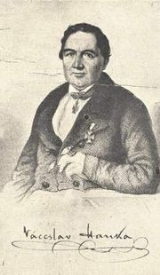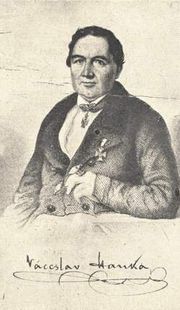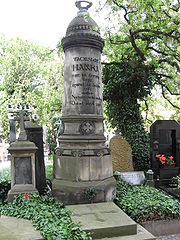
Václav Hanka
Encyclopedia


Czech people
Czechs, or Czech people are a western Slavic people of Central Europe, living predominantly in the Czech Republic. Small populations of Czechs also live in Slovakia, Austria, the United States, the United Kingdom, Chile, Argentina, Canada, Germany, Russia and other countries...
philologist.
Biography
He was born at HořiněvesHorineves
Hořiněves is a village in Hradec Králové Region of the Czech Republic. It is located 12 km northwest of Hradec Králové and has a population of 700 ....
near Hradec Králové
Hradec Králové
Hradec Králové is a city of the Czech Republic, in the Hradec Králové Region of Bohemia. The city's economy is based on food-processing technology, photochemical, and electronics manufacture. Traditional industries include musical instrument manufacturing – the best known being PETROF pianos...
(Königgrätz). He was sent in 1807 to school at Hradec Králové, to escape the conscription, then to the University of Prague
Charles University in Prague
Charles University in Prague is the oldest and largest university in the Czech Republic. Founded in 1348, it was the first university in Central Europe and is also considered the earliest German university...
, where he founded a society for the cultivation of the Czech language. At Vienna
Vienna
Vienna is the capital and largest city of the Republic of Austria and one of the nine states of Austria. Vienna is Austria's primary city, with a population of about 1.723 million , and is by far the largest city in Austria, as well as its cultural, economic, and political centre...
, where he afterwards studied law
Law
Law is a system of rules and guidelines which are enforced through social institutions to govern behavior, wherever possible. It shapes politics, economics and society in numerous ways and serves as a social mediator of relations between people. Contract law regulates everything from buying a bus...
, he established a Czech periodical; and in 1813 he made the acquaintance of Josef Dobrovský
Josef Dobrovský
Josef Dobrovský was a Bohemian philologist and historian, one of the most important figures of the Czech national revival.- Life & Work :...
, an eminent philologist.
On 16 September 1817 Hanka claimed that he had discovered some manuscripts of 13th- and 14th-century Bohemian poems in the church tower of the town of Königinhof an der Elbe (Dvůr Králové nad Labem
Dvur Králové nad Labem
Dvůr Králové nad Labem river valley.Dvůr Králové was first mentioned in 1270. It was a dowry town, owned by the King's wife and responsible for her expenses when her husband died. Today, it is a center of the textile and machinery industries....
, both meaning Queen's Court at the Elbe
Elbe
The Elbe is one of the major rivers of Central Europe. It rises in the Krkonoše Mountains of the northwestern Czech Republic before traversing much of Bohemia , then Germany and flowing into the North Sea at Cuxhaven, 110 km northwest of Hamburg...
in English) and later some more at Castle Grünberg (Zelená hora, Green mountain) near Nepomuk
Nepomuk
Nepomuk is a town in the Pilsen Region of the Czech Republic. It lies on the Mihovka River, some to the south-southwest from the region capital of Pilsen....
. The Manuscripts of Dvůr Králové and of Zelená Hora
Manuscripts of Dvur Králové and of Zelená Hora
The Manuscript of Dvůr Králové and the Manuscript of Zelená Hora , collectively abbreviated as RKZ, are epic Slavic manuscripts, claimed to have...
(Czech: Rukopisy Královédvorský a Zelenohorský) were made public in 1818, with a German translation by Swoboda. The originals were presented by him to the Bohemian museum at Prague, of which he was appointed librarian in 1818.
Great doubt, however, was felt as to their genuineness, and Dobrovský, by pronouncing the latter manuscript (also known as The Judgment of Libuše
Libuše
Libuše, Libussa or, historically Lubossa, is a legendary ancestor of the Přemyslid dynasty and the Czech people as whole. Libuše was the wisest of the three sisters and prophesied the foundation of Prague from her castle Libušín...
), to be an obvious fraud, confirmed the suspicion.
Some years afterwards Dobrovský saw fit to modify his decision, but modern Czech scholars regard the manuscript as a forgery
Forgery
Forgery is the process of making, adapting, or imitating objects, statistics, or documents with the intent to deceive. Copies, studio replicas, and reproductions are not considered forgeries, though they may later become forgeries through knowing and willful misrepresentations. Forging money or...
. A translation into English, The Manuscript of the Queen's Court
Manuscripts of Dvur Králové and of Zelená Hora
The Manuscript of Dvůr Králové and the Manuscript of Zelená Hora , collectively abbreviated as RKZ, are epic Slavic manuscripts, claimed to have...
, was made by Albert Henry Wratislaw
Albert Henry Wratislaw
Albert Henry Wratislaw was an English Slavonic scholar, of Czech descent.The grandson of an émigré of 1790, and son of William Ferdinand, 'Count' Wratislaw von Mitro-vitz , a solicitor of Rugby, by his wife, Charlotte Anne , was born at Rugby on 5 Nov. 1822. He entered Rugby School, aged seven, on...
in 1852.
In 1848 Hanka, who was an ardent pan-Slavist
Pan-Slavism
Pan-Slavism was a movement in the mid-19th century aimed at unity of all the Slavic peoples. The main focus was in the Balkans where the South Slavs had been ruled for centuries by other empires, Byzantine Empire, Austria-Hungary, the Ottoman Empire, and Venice...
, took part at the Prague Slavic Congress, 1848
Prague Slavic Congress, 1848
The Prague Slavic Congress of 1848 took place in Prague between June 2 and June 12, 1848. It was one of several times that voices from all Slav populations of Central Europe were heard in one place...
and other peaceful national demonstrations, being the founder of the political society Slovanská Lípa. He was elected to the imperial diet at Vienna, but declined to take his seat. In the winter of 1848 he became lecturer and in 1849 professor of Slavonic languages in the university of Prague. In 1846 he edited the Reims Gospel
Reims Gospel
Reims Gospel is a richly illustrated manuscript of ancient Slavic origin which became part of the Reims Cathedral treasury...
and made it available to the general public, for which he received the cross of the Order of St. Anna
Order of St. Anna
The Order of St. Anna ) is a Holstein and then Russian Imperial order of chivalry established by Karl Friedrich, Duke of Holstein-Gottorp on 14 February 1735, in honour of his wife Anna Petrovna, daughter of Peter the Great of Russia...
by the Tsar Nicholas I
Nicholas I of Russia
Nicholas I , was the Emperor of Russia from 1825 until 1855, known as one of the most reactionary of the Russian monarchs. On the eve of his death, the Russian Empire reached its historical zenith spanning over 20 million square kilometers...
and a brilliant ring by Austrian Emperor Ferdinand I
Ferdinand I of Austria
Ferdinand I was Emperor of Austria, President of the German Confederation, King of Hungary and Bohemia , as well as associated dominions from the death of his father, Francis II, Holy Roman Emperor, until his abdication after the Revolutions of 1848.He married Maria Anna of Savoy, the sixth child...
. He died in Prague on the 12th of January 1861.
Works
His chief works and editions are the following:- Hankowy Pjsne (Prague, 1815), a volume of poems
- Starobyla Skiadani (1817-1826), in 5 vols, a collection of old Bohemian poems, chiefly from unpublished manuscripts
- A Short History of the Slavonic Peoples (1818)
- A Bohemian Grammar (1822)
- A Polish Grammar (1839) (these two grammars were composed on a plan suggested by Dobrovský)
- Igor (1821), an ancient RussiaRussiaRussia or , officially known as both Russia and the Russian Federation , is a country in northern Eurasia. It is a federal semi-presidential republic, comprising 83 federal subjects...
n epic, with a translation into Bohemian - a part of the Gospels from the Reims manuscript in the Glagolitic alphabetGlagolitic alphabetThe Glagolitic alphabet , also known as Glagolitsa, is the oldest known Slavic alphabet. The name was not coined until many centuries after its creation, and comes from the Old Slavic glagolъ "utterance" . The verb glagoliti means "to speak"...
(1846) - the old Bohemian Chronicles of Delimit (1848)
- History of Charles IVCharles IV, Holy Roman EmperorCharles IV , born Wenceslaus , was the second king of Bohemia from the House of Luxembourg, and the first king of Bohemia to also become Holy Roman Emperor....
, by Procop Luph (1848) - Evangelium Ostromis (1853)
- Hanka also composed the song Moravo, Moravo!Moravo, Moravo!Moravo, Moravo! is a Czech patriotic song written by Václav Hanka, who claimed that it was an old Moravian folk song. Today it is sometimes used as an unofficial Moravian national anthem....
, sometimes used as a MoraviaMoraviaMoravia is a historical region in Central Europe in the east of the Czech Republic, and one of the former Czech lands, together with Bohemia and Silesia. It takes its name from the Morava River which rises in the northwest of the region...
n national anthemNational anthemA national anthem is a generally patriotic musical composition that evokes and eulogizes the history, traditions and struggles of its people, recognized either by a nation's government as the official national song, or by convention through use by the people.- History :Anthems rose to prominence...
.
Further reading
- Die ältesten Denkmäler der böhmischen Sprache, Prag 1840, http://books.google.com/books?id=kK8DAAAAYAAJ&printsec=titlepage&dq=author:%22V%C3%A1clav+Hanka%22+manuscript&lr=&source=gbs_summary_r#PPA5,M1
- Václav Hanka, Josef Linda: Manuscript of the Queen's Court: A Collection of Old Bohemian Lyrico-epic ..., 1852 http://books.google.com/books?id=GOwEHAAACAAJ&dq=author:%22V%C3%A1clav+Hanka%22+manuscript&lr=
- Albert Henry Wratislaw: The Queen's Court Manuscript, with Other Ancient Bohemian Poems., 1852, http://books.google.com/books?id=V0pyIAAACAAJ&dq=Manuscript+of+Queen%27s+Court

